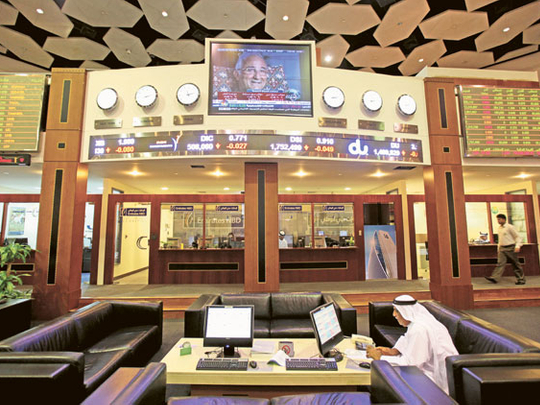
Dubai: Stock markets react to both positive and negative sentiments, but the manner and the extent of such reaction depends on the nature of a particular market, its depth and maturity.
The UAE stock market is not typically one that shows any great degree of maturity or sense of balance between adverse and favourable conditions. Analysts have often considered over-reaction to be the trademark of the local markets.
Some of the recent achievements of the market can be explained only in terms of such exuberance. The UAE market is among the 10 best performers this year within the global equity gauges tracked by Bloomberg. The daily average traded value this year is almost Dh3 billion compared to about Dh270 million two years ago.
Within the UAE market, Abu Dhabi has gained 15 per cent, while the Dubai benchmark index has risen by 24 per cent, making it the highest gainer in 50 of the world’s largest equity markets. Significantly, the trading activity has seen retail investors emerge as the predominant players as opposed to institutional investors.
These are remarkable achievements, but given the limited depth of the market, not easily digestible for those who know the market from close quarters. In fact, they see danger in over-expectation and unsustainable valuations. The impact of Dubai 2020 in stimulating the rebound in the economy is not questioned by anyone, but doubts are being expressed as to whether the effect is widespread enough to warrant such overwhelming sentiments in equity.
Analysts point to the limited spread of the impact of the build-up for the mega-event at this point of time, although it has contributed significantly to a clear upturn in certain sectors. There are signs of the property market slowly returning to pre-crisis levels in terms of valuations and demand is picking up vigorously.
The tourism and hospitality sectors also stand out with significant gains. Dubai has been the major beneficiary, but the effect is spilling over to Abu Dhabi and the northern emirates as well.
A worrying factor, however, is that the boom is not evenly spread and leaves out a major part of the overall economy from its impact. In fact, there is serious concern that the selective rebound is causing some harm to certain other sectors that have not benefitted from the build-up, but at the same time are facing cost disadvantages. This is affecting competitiveness in a number of sectors, which will ultimately weigh down the economy as a whole.
Also, the talk of another boom-bust cycle taking shape is growing louder, despite the slew of new regulatory initiatives put in place. A number of agencies, including IMF, have repeated the warning that more caution is required on the part of the government and the regulatory authorities to ward off negative tendencies and to prevent a recurrence of 2008. These messages obviously have implications for the stock market and some asset management firms have already turned the yellow lights on.
Blackrock Frontiers Investment Trust, part of major global asset manager Blackrock with some $4.3 trillion (Dh15.79 trillion) under management, for instance, announced last week that it had cut its exposure to the UAE markets because of signs that the markets were overheating. The asset management firm attributed its action to speculative excesses, which warranted caution.
Local brokerages have been voicing such concerns for quite some time, saying that the lack of depth in the market does not bode well, although the return of retail investors was a positive development. There has been a lurking fear that the Expo 2020-related optimism was somewhat overdone, particularly in terms of its fallout on rentals and other cost escalations in general as the economic rebound was not broad-based.
Latest developments prove that the jitters over the compartmentalised recovery are quite justified.
— The writer is a journalist based in Dubai.












